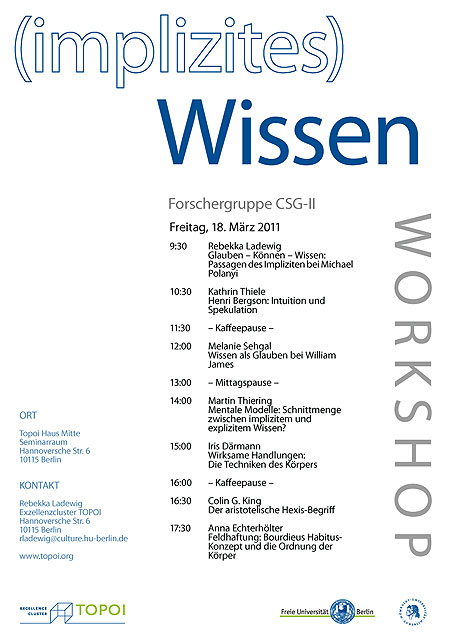The workshop focuses on forms of implicit or tacit knowledge – i.e. embodied, habitual, intuitive, virtuous, or subconscious practices, actions, and performances – that constitute and alter the perception, production, and representation of space. It is aimed at clarifying and specifying the concept of tacit knowledge.
The notion of “implicit” or “tacit” knowledge was first coined by the Hungarian chemist and philosopher of science Michael Polanyi in the early 1950ies. According to Polanyi, tacit knowledge – as opposed to explicit knowledge – first and foremost describes forms of practical knowing – a kind of knowing-in-action, i.e. embodied, skilled, virtuous and experienced knowledge components of individual actors. However, Polanyi’s notion of the implicit is not limited to bodily performances but also includes the sphere of theoretical knowledge. “We can know more than we can tell” is one of the core conclusions by Polanyi who conceived of knowledge as either implicit or rooted in implicit knowledge. How to think of such a broad concept of implicit knowledge? How exactly does it differ from and what similarities does it share with other theoretical approaches to practical knowledge, such as Marcel Mauss’s “Techniques of the Body”, Pierre Bourdieu’s notion of the “habitus”, or Gilbert Ryle’s distinction between “knowing how” and “knowing that”? How can we define tacit knowing with regard to concepts of the intuitive as described for instance by Henri Bergson? What affinities does it hold with regard to concepts of virtuosity, or the notion of “experiencedness” (Ludwik Fleck) that have come to be reconsidered in the last years especially in the field of the history of science?
Workshop-Reader: Download Reader [PDF]
18.3.2011 | |
Glauben – Können – Wissen: Passagen des Impliziten bei Michael Polanyi Rebekka Ladewig | |
Henri Bergson: Intuition und Spekulation Kathrin Thiele | |
Wissen als Glauben bei William James Melanie Sehgal | |
Mentale Modelle: Schnittmenge zwischen implizitem und explizitem Wissen? Martin Thiering | |
Wirksame Handlungen: Die Techniken des Körpers Iris Därmann | |
Der aristotelische Hexis-Begriff Colin Guthrie King | |
Feldhaftung: Bourdieus Habitus- Konzept und die Ordnung der Körper Anna Echterhölter |

